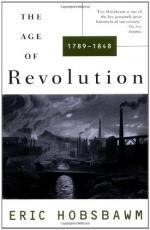
|
| Name: _________________________ | Period: ___________________ |
This quiz consists of 5 multiple choice and 5 short answer questions through Ideology: Secular.
Multiple Choice Questions
1. In Hobsbawm's account, what did the peasantry gain by land reforms sweeping the globe in the mid-1800s?
(a) Money.
(b) Culture.
(c) Tradition.
(d) Freedom.
2. What did Hobsbawm find in conservative thinking of the period?
(a) A strong tradition, in literature in particular.
(b) Hobsbawm did not find much of value.
(c) The beginnings of fascism.
(d) Myriad alternatives to industrialization.
3. Who invested in the railroads, in Hobsbawm's account?
(a) The working classes.
(b) All strata of society invested in the railroads.
(c) Nobles and aristocrats.
(d) Merchants and investors.
4. How did many countries impose this transformation of land use on the people?
(a) By founding colonies in the New World.
(b) By nationalizing church and state lands.
(c) By abolishing feudalism.
(d) By seizing the aristocrats' lands for the people.
5. What developed in other European countries, but not in France?
(a) A market for common goods.
(b) Nationalism.
(c) Militarism.
(d) An export market for luxury items.
Short Answer Questions
1. What trend was Hobsbawm looking for in revolts and revolutions?
2. Why does Hobsbawm say that the Industrial Revolution could only have happened in England?
3. Why did places that had not been conquered by France reform their land use, in Hobsbawm's opinion?
4. When did the Constituent Assembly create a new Constitution that turned France into a Constitutional monarchy?
5. What relationship had begun to dominate between landowners and farmers in England in the late 1700s?
|
This section contains 302 words (approx. 2 pages at 300 words per page) |

|




